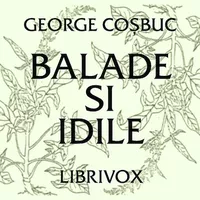Puntea lui Rumi
I
Rumi adunase-n creier
Toată cumințenia lumii —
Și-ntr-o zi regele Gupta
Cheamă la palat pe Rumi.
„Mâine-i Anul nou, știi bine.
Și-obicei din vremuri este
Ca-ntr-această zi să fie
Sărbătoare de neveste.
Și-aș dori vrun lucru mare !
Tu ești sfânt, așa se spune,
Faci minuni; și mâine tocmai
Ce n-aș da pentr-o minune.
Înmulțim splendoarea zilei
Vrei ? Găsești tu una-n pripă."
Rumi a rămas pe gânduri,
Negăsind răspuns o clipă.
Și-a plecat. Făcuse dânsul
Mari minuni de alădată,
Dar acum avea prilejul
Pentru cea mal minunată.
II
P-un șes larg sunt adunate
Gințile din Himalaia,
Oșteni negri-n coifuri albe,
Priricipi, preoți, sclavi și raia.
Toți bărbații stau d'oparte,
Iar la mijloc stau fecioare
Și neveste-n largă horă,
Toate-n port de sărbătoare.
Iar regina joacă-n frunte
Cu optzeci de principese.
La un semn s-alină jocul,
Și-acum Rumi-n mijloc iese.
El avea un cort d'oparte,
Iar în cort ? Cine-ar ști spune !
El încet desface cortul
Cu ascunsa lui minune.
Se ivesc doi stălpi, în urmă
Alții doi, apoi mărunte
Peste stâlpi câteva scânduri.
Ce era ? O simplă punte. —
„Rege, nimeni nu cunoaște
Ce-i in sufletul femeii,
Numai cei de sus ! Și iatä
Și-ntr-un lemn s-arată zeii !
De va trece peste punte
O femeie credincioasă,
Se va-nfrumoșa femeia,
Rămâind mereu frumoasă.
De va trece însa una
Care și-a-nșelat bărbatul,
Ea se va negri ca noaptea,
Astfel ispășind păcatul.
Dar eu cred că nu-i nici una
Cu păcate ! Cea mai castă
Treacă-ntâi! Și-apoi să treacă
Rând pe rând câte-o nevastă."
Și-a tăcut. Erau în șiruri
Zeci de mii de sute
De femei: ce de credință
La un loc, ce de virtute !
Dar virtutea — zice Veda —
Este mută, vecinic rece.
Gupta strigă, dă un ordin,
Dă pe-al doilea, dă vro zece
Ș-apoi zâmbitor privește
Spre regină — „De se poate,
Treci tu-ntâi, și după tine
Au să treacă-n urmă toate !"
— „Dacä vrei, eu trec, nu-mi pasä !
Dar chiar eu ? Nu se cuvine
Să pui, rege, la-ndoialä
Sufletul unel regine.
Mä-nroșește singur gândul
Că tu ai aflat cu cale
Tocmai azi să pui la probă
Inima nevestei tale !"
Și-a rămas pe loc regina,
Regele-a privit sinistru
Spre Nipunica, nevastă
Celui mai frumos ministru.
„Iară, rege, zise dânsa,
Nu pot suferi privirea
Multor ochi! Sunt sfiicioasă;
Eu aș trece, însă firea..."
Principesele-nroșite
Bucuros voiau să treacă,
Dar putea să mintă puntea,
Vrun nedrept putea să facă,
Ori mai știi ? Bătrânul Rumi
Face-o glumă, cum se vede ;
Și-i atât de slabă puntea,
Că-n ea nu te poți încrede.
Ș-apoi cum să creadă lumea
Ce vor spune niște lemne ?
Regele, mușcându-și gura,
A täcut, convins pesemne.
—„Dar minunea unde-i, Rumi ?"
Punând degetul pe frunte
A zâmbit bătrânul preot:
— „Puntea e ca orice punte !
Nici virtutea n-o arată,
Nci păcatul, dar azi, rege,
Dintr-o punte mincinoasă
Trei minuni tu poți alege.
Multe bunuri are omul,
Dar virtutea cea mai mare
E să nu se ție mândru
Cu virtuțile ce are ;
Deci nu-i o minune dacă
Dintr-atâte mii de sute
De femei, nici una mândră
N-am găsit de-a ei virtute ?
Iar frum'sețea-i bun netrainic
Și ispititor la rele,
Știu nevestele-acest lucru,
Și, vezi, ce cuminți sunt ele!
Când ajungerea frumuseții
Este-atât de lesnicioasă,
Nu-i minune că nici una
N-a voit a fi frumoasă ?
Iar minunea cea de-a treia,
Care va fi vecinic nouă,
E că toți noi până astăzi
N-am știut pe cele două !"
A râs regele, curtenii
Toți au râs, și-a râs poporul
Și-a râs însuși sfântul Rumi,
De minuni iscoditorul.
Dar râzând, priveau bărbații
Neîncrezători la scânduri:
I-a cuprins o presimțire
Și-au căzut pe multe gânduri,
Iar nevestele ? Vădite
Cu virtutea-n fața lumii,
Făceau haz că d-astă dată
A pățit rușine Rumi.

